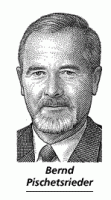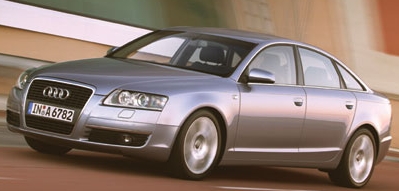VW ‘now’ considering ‘Customer First’ approach
Posted By RichC on September 19, 2005
 Bernd Pischetsrider in a quote from today’s WSJ stated that after so many years of enjoying 50% growth through the 90s, particularly in US demand for the VW Jetta and New Beetle, that VW management really wasn’t listening to what the customer wanted. VW’s new policy will be to ask the question: “how does it help the customer and will the customer pay for it. When we have a test drive, the question is not whether I like it. It’s will the customer pay for it? Or will the customer not even notice.”
Bernd Pischetsrider in a quote from today’s WSJ stated that after so many years of enjoying 50% growth through the 90s, particularly in US demand for the VW Jetta and New Beetle, that VW management really wasn’t listening to what the customer wanted. VW’s new policy will be to ask the question: “how does it help the customer and will the customer pay for it. When we have a test drive, the question is not whether I like it. It’s will the customer pay for it? Or will the customer not even notice.”
Audi, Skoda and Seat will no longer make product investment decisions on their own. They will include top managers like Mr. Pischetsrider who will first decide if the market is there for the decisions are made and “which market niche they want to attack.” They will then ask “is this a niche for brand A, B, C or D?”
Perhaps I’m stretching it here, but noticing in a few prior articles that “there has been a massive interest in demand for the Jetta diesel” in the US according to statements made by Len Hunt, the top U.S. executive for the Volkswagen brand, but maybe that means we’ll get a few more models? Hunt states, “Initially we thought diesel demand might be 15 percent of the Jetta sales in the U.S. and it’s more than 20 percent already and rising. It was under way before, but Katrina has accelerated it.”
Volkswagen has been short inventory of US diesel cars and is has commented that it is particularly short Jettas with “automatic transmissions because traditional diesel buyers prefer a manual gearbox.” Len Hunt states that “many of the new buyers are first-time diesel owners.” I personally believe that the DSG gearbox available in the New Jetta might make a difference too? Texans, which has the largest number of pickup truck buyers that are often diesels, have been quick to purchase the new Jettas with diesels. Sales of TDIs in Texas have more than doubled to about 30 percent of VWoA car sales in that state.
Volkswagen is also working with Archer Daniels Midland in testing diesel models to see if they can operate properly using diesel fuel that is composed of 20 percent renewable components such as soybean oil (see article). Current models are only approved with 5 percent biodiesel (B5), but with the pressure to reduce dependence on foriegn oil see potential in possibly approving a 20% blend. (B20)
Volkswagen is not the only company interested in promoting clean diesel vehicles in the US. DaimlerChrysler AG’s Dieter Zetsche, who will take over as chief executive in January when Juergen Schrempp retires, has said U.S. demand for Jeep Liberty SUV and Mercedes E-Class sedan with diesels was already exceeding initial expectations before the hurricane as gasoline prices rose. Zetsche was head of Chrysler and now leads the Mercedes Car Group.
Mercedes sold 470 diesel versions of the E-Class in August, a “significant” increase from the 250 to 300 diesel models it normally sells, according to U.S. Mercedes chief Paul Halata. He credits the oil shock of the 1980s with helping attracting U.S. buyers to Mercedes in the first place and at one point driving diesels to 70 percent of U.S. sales.
Hopefully those of us seeing the efficient diesel improving the US energy picture will see continued growth in both the vehicle choice and the fuels. If Bernd Pischetsrieder is listening to what the market is indicating here in the US, he needs to start bring us a few more diesel models to the US … and soon.
BTW … several other European manufacturers have announced that they intend to export diesels to the US and are undergoing US federalization. I’m anxious to see something from Audi, as they have announced that the A6 is slated for the 2008 model year.

Comments